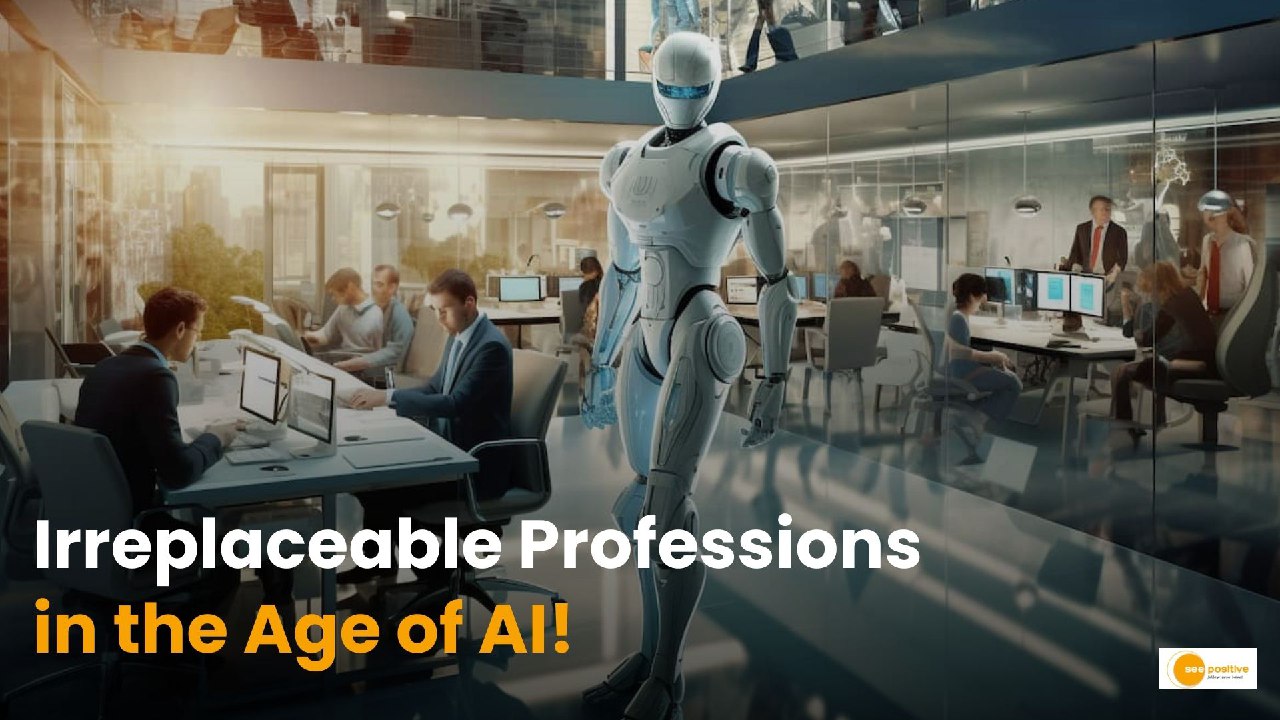AI: Numerous sectors have undergone a transformation because to artificial intelligence (AI), which automates operations that formerly required human labor and judgment. Even as AI develops, some occupations will never be fully replaced by it since they are inherently dependent on characteristics that are specific to humans. These professions require human abilities that technology cannot replace, such as intuition, creativity, emotional intelligence, and ethical judgment. These are a few careers that AI will never be able to completely replace.
1. Medical Professionals
Physicians and Surgeons The medical industry is complicated and demands not just a thorough comprehension of science but also the capacity for compassionate and thoughtful decision-making when it comes to life and death. AI can help with diagnosis and even do precise procedures, but it cannot take the place of a human being who can understand a patient’s requirements, show empathy, and make thoughtful decisions. Surgeons and physicians deal with situations that are out of the ordinary, take into account the whole health of their patients, and frequently make decisions based on insufficient information—tasks that are peculiarly suited to human capacities.
– Nurses: The nursing profession blends emotional support with medical understanding. Beyond meeting patients’ basic needs, nurses provide consolation and confidence at times of vulnerability. Artificial intelligence (AI) can track a patient’s vitals and deliver medication, but it is unable to offer nurses’ individualized attention and emotional support.
2. Creative Professionals
Authors and Writers: Writing is an intensely creative process that calls for creativity, storytelling, and the capacity to emotionally engage readers. AI lacks the human experience, cultural awareness, and creative spark necessary to produce meaningful literature and gripping narratives, even while it can produce writing based on data and algorithms.
– Performers and Artists: The profound expression of human emotion and creativity is found in the arts. Artificial intelligence is capable of producing art and music and imitating styles, but it is unable to replace human artists’ and musicians’ sources of inspiration, cultural background, and life experiences. Not only does the making of art and music require technical proficiency, but it also requires the human ability to communicate complicated feelings and concepts.
3. Instructors
Professors and Teachers: There is much more to education than just imparting knowledge. It entails motivating pupils, being aware of their unique needs, and modifying instructional strategies to accommodate various learning preferences. AI cannot replace the moral leadership, emotional support, and mentoring that teachers offer. AI cannot replace the human touch needed to develop curiosity, encourage critical thinking, and create a positive learning environment.
4. Counselors and Psychologists
A thorough grasp of human behavior, emotions, and mental health is necessary for the study of psychology. Psychologists and counselors offer individualized care and support to help people negotiate difficult emotional environments. Artificial Intelligence (AI) can help with data analysis and even provide rudimentary counseling services, but it cannot take the place of human specialists’ sensitivity, intuition, and sophisticated knowledge when it comes to mental health care.
5. Social Workers
Social work entails interacting with people on an individual and community level to tackle intricate social concerns. Social workers help people in need, frequently in difficult and emotionally charged circumstances, by offering services, advocacy, and support. AI cannot replace the empathy, cultural awareness, and social system navigation skills needed for this vocation.
6. Attorneys
Judges and Attorneys: The legal profession is based on the application of the law, morality, and the pursuit of justice. In order to make decisions that may have a significant influence on both persons and society, judges and attorneys must apply the law to particular and frequently complex situations. Artificial intelligence (AI) can help with legal research and document analysis, but it cannot take the role of human judgment and ethical reasoning that are necessary in court.
7. Human Resource Managers
Managing human resources calls for more than just recruiting and firing; it also entails recognizing behavior in people, maintaining interpersonal connections, and developing a strong workplace culture. HR specialists work with difficult human dynamics, employee growth, and conflict resolution. AI is capable of managing certain administrative duties, but it cannot take the role of human understanding and emotional intelligence, which are essential for good people management.
8. Research Scientists
Curiosity, inventiveness, and the will to learn are the main forces behind scientific research. Although artificial intelligence (AI) can help with data analysis and automate some experiments, it lacks the creativity and critical thinking needed to develop hypotheses, plan experiments, and analyze findings. Because they are intrinsically curious and think beyond the box, research scientists push the boundaries of knowledge.
9. Business Leaders and Entrepreneurs
Business Leadership: Making judgments just on the basis of data is not enough for a company’s leader. It calls for imagination, vision, and the capacity to motivate and guide a group of people through adversity. Business executives innovate, take chances, and overcome obstacles in ways that AI cannot. Though AI can offer insightful information, human leadership and strategic thought are essential for managing a firm.
10. Ethicists and philosophers – As artificial intelligence (AI) advances, moral concerns about its application will become more crucial. The moral implications of technology, society, and human conduct are studied by ethicists and philosophers. These occupations require in-depth introspection, moral thinking, and value exploration—all domains in which human understanding is indispensable. While AI is capable of data analysis, it is unable to make moral decisions or comprehend the intricacies of human life.
Positive takeaway
Without a doubt, AI has revolutionized a number of industries and will be crucial going forward. But there is still no substitute for the creative, empathetic, morally grounded, and human connection-driven professions. It is critical to acknowledge the importance of these distinctively human traits and the roles that only humans can play as AI develops.


